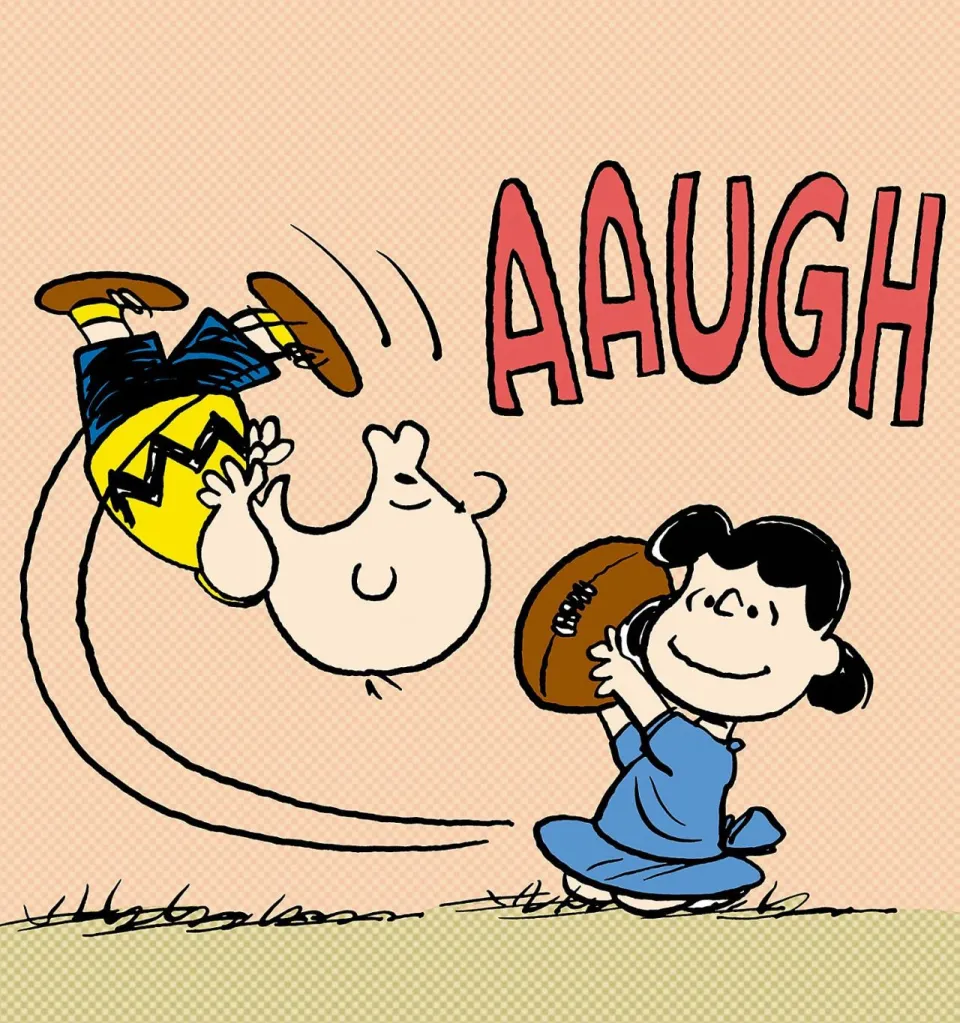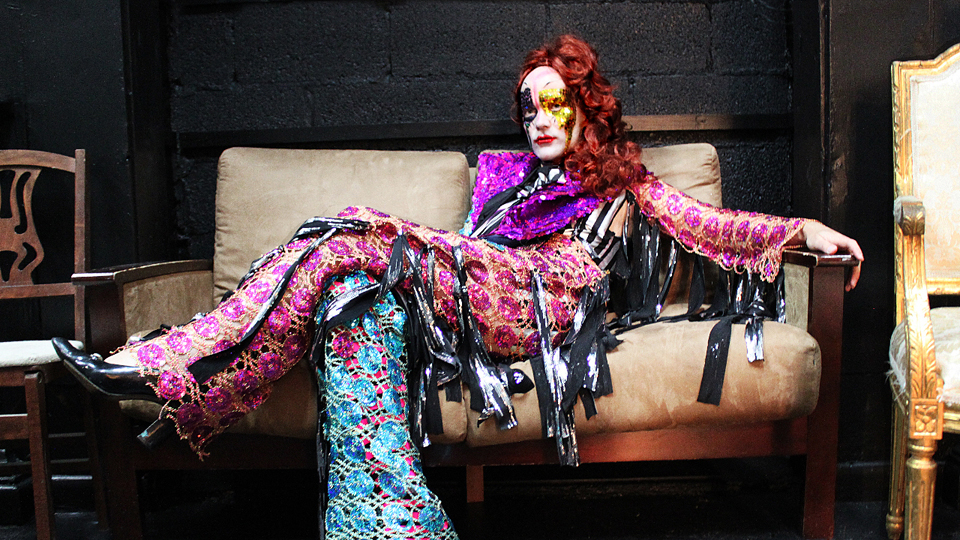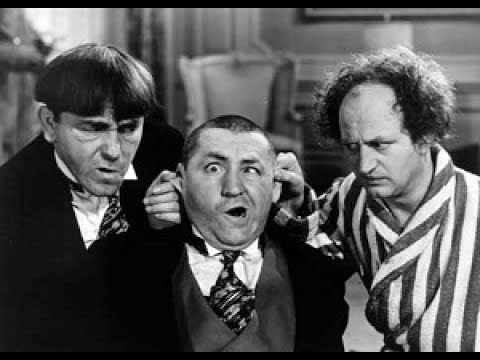
I suspect I’m dating myself, but does anyone else remember the Peanuts cartoons? Specifically that endlessly repeated gag (more like heart-wrenching tragedy) of Lucy offering to hold the football for poor, hapless Charlie Brown so he can kick it? Of course, she winds up pulling it away just in time for him to miss the kick and fly through the air screaming, then land in a heap, bruised and miserable, furious at himself for placing his trust once again in a faithless so-called friend.
Law firms do that. I mean, they do the Lucy bit, with the football.
“So…when you say he promised you’d be elevated to partner,” I asked one client just the other day, “Do you mean, as in, he actually promise promised to make you partner…or just sort of implied strongly it would happen?”
My client’s response was unequivocal: “He promised.”
I fumbled for wiggle room. “But can he do that? How much capital does this guy have at the firm to burn on elevating one of his own?”
My client wasn’t taking wiggle for an answer: “He’s the managing partner of a smallish firm. He can elevate whomever he wants.”
Wait. Hang on…one more question: “Did he specify when he’d make you partner?”
Now I had him. Because the unfailing law firm answer to any question regarding something good that’s going to happen to you (i.e., not to them) is: Not now…but soon.
Promising stuff to you (not now, but soon) is actually a key law firm technique for getting what they want from you (immediately.)
The looming temporal gulf between what they offer to you and what they demand from you is acute. It is stark. It is striking.
Compare and contrast:
The stuff they offer to you will arrive whenever they please, which seldom means anytime remotely contemporaneous with the current era. (And, no, don’t bother them about it, or they might change their minds.)
The stuff they require from you, on the other hand, will happen immediately. This very minute. As in, I’m aware it’s Saturday night, and no, I don’t care. I’m not asking – that’s me being polite. I’ll have it Monday morning or you’re fired.
That kind of right now. Law firm right now.
Returning for a moment to those lovely, tasty things that they’re promising to you… It’s worth asking just how long a period of time not now, but soon can be drawn out to occupy, at least in the minds of those who run law firms.

 You are really, really sick of law. In fact, you want out. At a minimum, you need to get out of your current job, or you might die. That much is not in dispute.
You are really, really sick of law. In fact, you want out. At a minimum, you need to get out of your current job, or you might die. That much is not in dispute. 

 Before I was a psychotherapist, I was a patient, and at some point in my time as a patient, I participated in group therapy, and witnessed an unsettling interaction. (Unsettling-interaction-witnessing occurs in groups, where you spend time watching people “work their stuff out” and often “work your stuff out” at the same time.)
Before I was a psychotherapist, I was a patient, and at some point in my time as a patient, I participated in group therapy, and witnessed an unsettling interaction. (Unsettling-interaction-witnessing occurs in groups, where you spend time watching people “work their stuff out” and often “work your stuff out” at the same time.) To talk about lawyer burnout in a meaningful way, we have to mention the finish line problem. It’s the common element in every lawyer burnout story I’ve heard.
To talk about lawyer burnout in a meaningful way, we have to mention the finish line problem. It’s the common element in every lawyer burnout story I’ve heard. We all know lawyers are pleasers. Everyone knows that. The weird thing is how it doesn’t feel that way from the inside. When you are a lawyer, and a pleaser, you don’t think you’re a pleaser – it seems more like you’re the only conscientious person in the world. You are the one who shows up on time, sits in the first row and hands your homework in on schedule, always perfect. Other people don’t, and that’s annoying. Thus begins a typical lawyer pet peeve – that other people never live up to their obligations. Stretch that out to the extreme, and you wind up doing a job where you bill 3,000 hours a year, just to set a good example for everyone else.
We all know lawyers are pleasers. Everyone knows that. The weird thing is how it doesn’t feel that way from the inside. When you are a lawyer, and a pleaser, you don’t think you’re a pleaser – it seems more like you’re the only conscientious person in the world. You are the one who shows up on time, sits in the first row and hands your homework in on schedule, always perfect. Other people don’t, and that’s annoying. Thus begins a typical lawyer pet peeve – that other people never live up to their obligations. Stretch that out to the extreme, and you wind up doing a job where you bill 3,000 hours a year, just to set a good example for everyone else. Blue’s Clues was a children’s television program developed in the 1990’s with the cooperation of child psychologists. The show was unique because it sought to incorporate the findings of cognitive psychology research on children into its content and presentation – a goal that produced surprising results.
Blue’s Clues was a children’s television program developed in the 1990’s with the cooperation of child psychologists. The show was unique because it sought to incorporate the findings of cognitive psychology research on children into its content and presentation – a goal that produced surprising results. “I don’t think…I mean…I’m not someone it would be fair to call a gunner…do you think?” My client asked, a quiver of trepidation in her voice.
“I don’t think…I mean…I’m not someone it would be fair to call a gunner…do you think?” My client asked, a quiver of trepidation in her voice. Isolation is a popular topic with my lawyer clients. There are so many varieties of biglaw loneliness I hardly know where to start explicating the phenomenon. One client summed up his particular variant:
Isolation is a popular topic with my lawyer clients. There are so many varieties of biglaw loneliness I hardly know where to start explicating the phenomenon. One client summed up his particular variant: I just turned fifty, so I can tell you about old. Old isn’t merely the words “Mission: Impossible” conjuring memories of a show you watched as a kid in 1973 on a “color console tv set” the size of a freezer chest. Old transcends. Old abides. Old pushes through to not caring if everyone else’s memories zip directly to a movie with Tom Cruise hanging off a cliff. Old concedes Jean-Luc Picard a place in the pantheon beside Kirk and Spock, but remains firm in its belief Peter Graves and the miniature reel-to-reel tape player that self-destructed after five seconds were the height of awesome, Tom Cruise or no Tom Cruise. Old is about “values.” Old doesn’t haggle over this stuff.
I just turned fifty, so I can tell you about old. Old isn’t merely the words “Mission: Impossible” conjuring memories of a show you watched as a kid in 1973 on a “color console tv set” the size of a freezer chest. Old transcends. Old abides. Old pushes through to not caring if everyone else’s memories zip directly to a movie with Tom Cruise hanging off a cliff. Old concedes Jean-Luc Picard a place in the pantheon beside Kirk and Spock, but remains firm in its belief Peter Graves and the miniature reel-to-reel tape player that self-destructed after five seconds were the height of awesome, Tom Cruise or no Tom Cruise. Old is about “values.” Old doesn’t haggle over this stuff. Congratulations, you’ve “gained admission” to a lower-tier law school! You might be wondering what the actual experience is going to be like. Well, if you’re one of those lucky souls who’s had the unique pleasure of matriculating at Trump University, you’re at a big advantage, because lower-tier law schools and Trump University are a whole lot alike. Let’s count the ways:
Congratulations, you’ve “gained admission” to a lower-tier law school! You might be wondering what the actual experience is going to be like. Well, if you’re one of those lucky souls who’s had the unique pleasure of matriculating at Trump University, you’re at a big advantage, because lower-tier law schools and Trump University are a whole lot alike. Let’s count the ways: This one really happened – and it happened to yours truly (as opposed to the usual disguised anecdote loosely based on a factually altered tale from one or more carefully anonymized clients.)
This one really happened – and it happened to yours truly (as opposed to the usual disguised anecdote loosely based on a factually altered tale from one or more carefully anonymized clients.) I’m always hearing that I’m a downer, that all I ever write about is the negative side of law. Nothing could be further from the truth. If The People’s Therapist has one precept he lives by, it’s that old adage (okay, so maybe it’s a tenet) from management theory: Don’t bring me a problem unless you’re also bringing me a solution. It’s hardly my issue that all people ever seem to bring me (at least where law’s concerned) is problems. I’m drowning in their problems, and they must have the wrong guy, because I’m a constitutionally upbeat, constructive person – all about solutions, and upbeat ones, at that. Upbeat, constructive solutions are my forte. But these law people…what can I say? They just keep coming with the problems.
I’m always hearing that I’m a downer, that all I ever write about is the negative side of law. Nothing could be further from the truth. If The People’s Therapist has one precept he lives by, it’s that old adage (okay, so maybe it’s a tenet) from management theory: Don’t bring me a problem unless you’re also bringing me a solution. It’s hardly my issue that all people ever seem to bring me (at least where law’s concerned) is problems. I’m drowning in their problems, and they must have the wrong guy, because I’m a constitutionally upbeat, constructive person – all about solutions, and upbeat ones, at that. Upbeat, constructive solutions are my forte. But these law people…what can I say? They just keep coming with the problems. I participated on a panel last year with an expert on “happiness studies” and naturally, as someone who works with lawyers, I found myself inverting the customary nomenclature. While the relevance of “happiness studies” to the legal profession might fairly be questioned, it would be foolhardy to minimize the implications of “unhappiness studies” with regard to lawyers’ lives. I would venture a step further, to aver that law, as a profession, holds immense promise for future “unhappiness studies” research.
I participated on a panel last year with an expert on “happiness studies” and naturally, as someone who works with lawyers, I found myself inverting the customary nomenclature. While the relevance of “happiness studies” to the legal profession might fairly be questioned, it would be foolhardy to minimize the implications of “unhappiness studies” with regard to lawyers’ lives. I would venture a step further, to aver that law, as a profession, holds immense promise for future “unhappiness studies” research. The verb “to gaslight” comes from a 1938 stage play (which was then made into two movies, one starring Ingrid Bergman.) The plot is super-creepy, especially for 1938. In it, an evil husband tricks his young wife into believing she’s losing her mind by staging bizarre occurrences in their house, then pretending only she’s seeing and hearing them (yes, he’s after her money.) His favorite trick is dimming the gas lights in her room before clomping around upstairs or making strange sounds emanate from the walls. Soon she’s freaking out whenever the lights dim, expecting another bad trip. After each freak-out, once she’s good and melted down, he rushes to her aid, feigning concern.
The verb “to gaslight” comes from a 1938 stage play (which was then made into two movies, one starring Ingrid Bergman.) The plot is super-creepy, especially for 1938. In it, an evil husband tricks his young wife into believing she’s losing her mind by staging bizarre occurrences in their house, then pretending only she’s seeing and hearing them (yes, he’s after her money.) His favorite trick is dimming the gas lights in her room before clomping around upstairs or making strange sounds emanate from the walls. Soon she’s freaking out whenever the lights dim, expecting another bad trip. After each freak-out, once she’s good and melted down, he rushes to her aid, feigning concern. I recently attended a conference at a law school – a pretty good law school – and they invited me to appear on a panel and paid for my transportation and even offered a hotel (if I needed one, which it turns out I didn’t, but still…nice.)
I recently attended a conference at a law school – a pretty good law school – and they invited me to appear on a panel and paid for my transportation and even offered a hotel (if I needed one, which it turns out I didn’t, but still…nice.) Readers of my blog express surprise when they discover that all my clients aren’t lawyers – indeed, a small but sizable percentage of my clientele consists of ordinary civilians, non-combatants, plain folk who have nothing whatsoever to do with law. But the people surprised by this situation are mostly biglaw lawyers – and what really surprises them is not that I work with non-lawyers, but that I work with non-lawyers employed in biglaw – secretaries, law librarians, human resources folks, paralegals and so on. In other words, what surprises them is that I work with those people, those other people.
Readers of my blog express surprise when they discover that all my clients aren’t lawyers – indeed, a small but sizable percentage of my clientele consists of ordinary civilians, non-combatants, plain folk who have nothing whatsoever to do with law. But the people surprised by this situation are mostly biglaw lawyers – and what really surprises them is not that I work with non-lawyers, but that I work with non-lawyers employed in biglaw – secretaries, law librarians, human resources folks, paralegals and so on. In other words, what surprises them is that I work with those people, those other people. My client – a second year corporate associate working in a foreign office – compared remaining at her biglaw firm to eating cockroaches.
My client – a second year corporate associate working in a foreign office – compared remaining at her biglaw firm to eating cockroaches.


